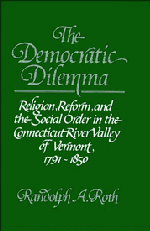 The Democratic Dilemma
The Democratic Dilemma Book contents
- Frontmatter
- Contents
- List of tables and maps
- Acknowledgments
- Introduction
- 1 The revolutionary frontier, 1763–1800
- 2 The failure of the covenanted community and the standing order, 1791–1815
- 3 Religion and reform in the shaping of a new order, 1815–1828
- 4 From an era of promise to pressing times, 1815–1843
- 5 A clamor for reform, 1828–1835
- 6 The great revival, 1827–1843
- 7 A modified order in town life and politics, 1835–1850
- 8 Boosterism, sentiment, free soil, and the preservation of a Christian, reformed republic
- Conclusion: Religion, reform, and the problem of order in the Age of Democratic Revolution
- Appendix A Church records
- Appendix B Types of towns
- Appendix C Occupational groups
- Appendix D Statistical methods
- Notes
- Index
4 - From an era of promise to pressing times, 1815–1843
Published online by Cambridge University Press: 04 August 2010
- Frontmatter
- Contents
- List of tables and maps
- Acknowledgments
- Introduction
- 1 The revolutionary frontier, 1763–1800
- 2 The failure of the covenanted community and the standing order, 1791–1815
- 3 Religion and reform in the shaping of a new order, 1815–1828
- 4 From an era of promise to pressing times, 1815–1843
- 5 A clamor for reform, 1828–1835
- 6 The great revival, 1827–1843
- 7 A modified order in town life and politics, 1835–1850
- 8 Boosterism, sentiment, free soil, and the preservation of a Christian, reformed republic
- Conclusion: Religion, reform, and the problem of order in the Age of Democratic Revolution
- Appendix A Church records
- Appendix B Types of towns
- Appendix C Occupational groups
- Appendix D Statistical methods
- Notes
- Index
Summary
Economic development in the valley and the nation had been constrained by international hostilities and trade embargoes since 1807. The economy was expected to rally when the War of 1812 ended, but the crop failure of 1816, the return of inexpensive British manufactured goods to American markets, and the scarcity of lending capital during the financial panic of 1819, hampered economic growth throughout the country as late as the early 1820s. Still, both the national and the local economies grew steadily from the early 1820s through the 1830s. The annual rise in per capita income was not large by standards of modern industrial societies – only I percent nationally – but by previous standards it was dramatic. Certainly it was large enough for the valley's politicians to proclaim blithely that “old king ‘Hard Times’ had been knocked in the head once and for all.”
By the late 1820s and early 1830s that optimism appeared to some to be mistaken, and by 1834–5, people had begun to complain of “the pressures of the times” and to look “with melancholy forbodings to the future.” The problem was that growth had reneged on what people thought of as its most important promises: the promise that family and community life would go on undisturbed, that every citizen and every town would share in the prosperity with rough equality, and, most important, that opportunity would increase for those who wished someday to operate their own farms and shops.
- Type
- Chapter
- Information
- The Democratic DilemmaReligion, Reform, and the Social Order in the Connecticut River Valley of Vermont, 1791–1850, pp. 117 - 141Publisher: Cambridge University PressPrint publication year: 1987


